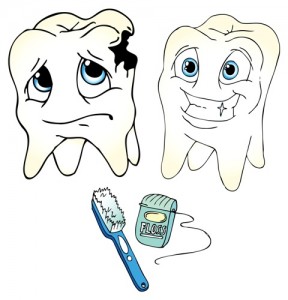by Dr Thomas Cooke Raleigh Wakeforest NC

Tooth Decay and Prevention
The hardest material that the body is made up of is dental enamel, however it is susceptible to tooth decay. This hard tissue gets much wear and tear over its lifetime . When bacterial acids, food acids, stomach acids, or mechanical trauma breaks the outer part of the enamel, the decay process starts. Dental plaque is the main culprit in unzipping the enamel and allowing the tooth destruction to begin. Dental plaque is made up of bacteria and food that adheres to your teeth after a meal which is not successfully brushed off. This plaque forms a sticky substance that adheres to the outer surfaces of your teeth that releases acids. After the acids from the plaque successfully break through the enamel, a cavity forms which can quickly enlarge to grow towards the nerve if not treated soon.
How to prevent tooth decay
Preventing the destruction of the enamel and the dentin part of the tooth is preventing tooth decay. The destruction occurs from bacteria acids released from the bacteria after they consume sugars and starches from our diet. Plaque is formed from bacteria, acid, and food debris mixed with saliva. Plaque attaches to the tooth structure and causes a hole in the tooth called a cavity. Preventing all of this is best done by good oral hygiene. Good oral hygiene habits are brushing and flossing daily. Brushing after every meal is ideal and is sometimes not possible. Using a fluoridated tooth paste is very important also. Fluoridated mouth rinses are very helpful in keeping the enamel part of the tooth strong.
Healthy foods that help prevent decay
Eating two vegetables and a protein and limiting carbohydrates such as candy, pretzels and chips is very important in preventing cavities. The foods that allow for increased plaque buildup are the sticky carbohydrates which will stay around and allow for bacteria to release acid and destroy the enamel. The grooves and pits of the tooth will catch cookies but will not catch fruits and vegetables. No Sugar gum and unsweetened drinks will allow for foods to be washed away.
Fluoride treatments
Fluoride treatments can be very significant in preventing tooth decay. Children that do not drink fluoridated water should consider a fluoride prescription up to the age of 12. Children and adults should use a fluoridated toothpaste as long as they can control the paste in their mouth and do not swallow it. People on medications that cause dry mouth as a side effect should consider a prescription toothpaste to prevent root decay. People that are going through braces should also consider a special fluoridate toothpaste to help prevent problems called demineralization.
Regular dental visits
Regular dental visits can be considered seeing your dentist every 6 months or at a yearly interval for an exam. Having your teeth checked yearly will allow the dentist to find smaller problems which will result in fixing a cavity before it gets too large where it may need a root canal.
Who is at risk the most to get decay
People that do not brush and floss correctly will be more prone to getting decay. Patients that are on medication that causes dry mouth will be more prone to decay. Those that are in the habit of eating carbohydrates and candy and not brushing correctly afterwords will be more prone to tooth decay. Unnatural areas in the mouth allow for more food to be trapped such as spaces or rough dental work. These areas will decay faster due to a higher amount of plaque buildup. Smokers and snackers that don’t brush and floss well will find that they have more dental problems due to decay.
